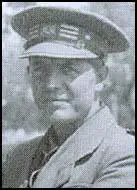Hugh Slater

Humphrey Richard Hugh Slater was born in 1906. His childhood was spent in South Africa but he came to London to study at the Slade School of Art. A talented painter, William Coldstream considered him "a very gifted and rare artist".
Slater joined the Communist Party of Great Britain and for a while was a reporter of Imprecor, the English-language newspaper of the Comintern.
in 1936 decided to join the armed forces supporting the Popular Front government in Spain. During the Spanish Civil War he became a political commissar in the British Battalion. Jim Brewer, one of his fellow soldiers, complained that a friend of his got into a political argument with Slater. As a result of this dispute, Slater threatened to have him shot. An official report claimed that Slater was "a leader almost of genius" but "with insufficient judgement of men".
Tony McLean, who served with the British Battalion, spent a lot of time with Slater. He later recalled that Slater "was very brave but extremely arrogant." Slater was eventually appointed Chief of Operations for the International Brigades. This included dealing with looters. Donald Perfect, was one of those who was arrested for stealing from churches and private houses. In his kitbag was a solid gold crucifix that was ten inches long, three gold ashtrays and a set of silver fish knives. Slater told the leadership of the CPGB that: "The usual practice in Spain is to shoot looters without trial."
During the Second World War the journalist, Tom Wintringham wrote several articles where he argued that the Home Guard should be trained in guerrilla warfare. Tom Hopkinson and Edward Hulton came up with the idea private training school for the Home Guard. On 10th July 1940, Wintringham was appointed as director of the Osterley Park Training School at Isleworth, Middlesex. Wintringham knew Slater from the Spanish Civil War and appointed him as one of the Osterley's instructors. In the first three months he trained 5,000 in the rudiments of guerrilla warfare.
The War Office became concerned about the activities of the Osterley Park Training School. The Inspector's Directorate of the Home Guard reported in July 1940: "While approving of the school in principle, the London District Assistant Commander did not think the Instructors were of a suitable type because of communistic tendencies." On 10th September General Pownall informed the Inspector's Directorate that "the school at Osterley was gradually being taken over by the War Office." In the spring of 1941 Slater and Tom Wintringham were both dismissed from his post as director of the training school.
Slater became a private in the British Army. According to Hugh Purcell, the author of Last English Revolutionary, Slater "was sent to an anti-aircraft unit". Slater also published several books on military tactics including Home Guard for Victory (1941) and War Into Europe (1941).
After the war Slater was editor of Polemic (1945-47). He was also the author of a novel about Soviet spies, The Conspirator (1948), that was later made into a film starring Elizabeth Taylor, Robert Taylor and Honor Blackman.
Hugh Slater died in 1958.
Primary Sources
(1) James Hopkins, Into the Heart of the Fire: The British in the Spanish Civil War (1998)
Jim Brewer contrasted Sam Wild with the middle-class commissar and later commander of the Anti-Tanks, Hugh Slater, who "was a travesty of an officer." An intimidating ideologue, Slater paid more attention to appearance than the importance of the task he was to perform. This was not the case with Wild. Under his command, the British continued to fight bravely and well.
(2) Hugh Slater, Home Guard for Victory (1941)
From a military point of view the Home Guard, combined with the regular forces, makes a military occupation by German Fascists fantastically improbable. Politically, a fully developed Home Guard provides an absolute guarantee against both the crude fascism of Mosley and the more insidious Fifth Column activities of any would-be British Petains.
(3) Time Magazine (30th June, 1941)
Last week doughty, democratic, battle-scarred Thomas H. Wintringham, 43, was allowed to resign from the leadership of Britain's Home Guard Training School, which he so largely created. Many an observer of Britain's war effort wondered whether the War Office - at times seemingly bow-&-arrow minded - was trying to lose the war.
Veteran of World War I and of the Spanish Civil War, in which he commanded the British battalion of the International Brigade, Tom Wintringham wrote and harangued against the spit-&-polish, close-order drill snobbery of Sandhurst. In a handbook called New Ways of War (TIME, Nov.11), he insisted that the only way to repel an invasion was to supplement Britain's regular forces with an army of 4,000,000 civilians trained with maximum democracy and efficiency. To this end the Home Guard Training School was organized, and Tom taught his men sniping, barricading, bombing with homemade bombs, garroting, how to decapitate an onrushing enemy motorcyclist with a piano wire, all the impromptu arts of guerrilla warfare.
Recently, just as Hugh Slater, the International Brigade's Chief of Staff, was about to be gazetted Home Guard major, the Army conscripted him as a private. The Army also grabbed Surrealist Painter Roland Penrose, Tom Wintringham's star camouflage lecturer.
Wrote Guerrillista Wintringham, probably well aware that his fellow-traveling had done him no good with the brass hats: "The present policy of the War Office starves the Home Guard of manpower and materials and treats as relatively unimportant all those ideas of modern-training tactics that I have been advocating." He quit.

